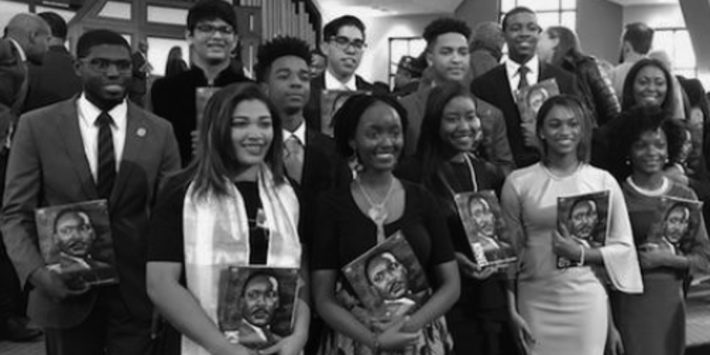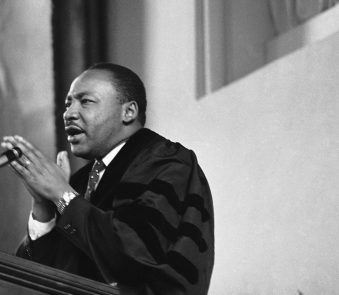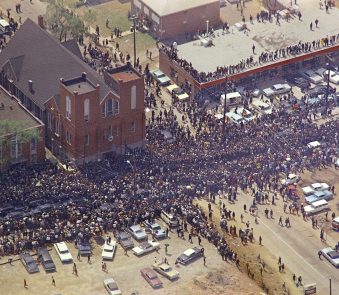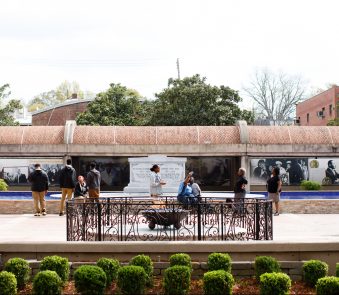Becoming The Dreamer: How Speaking At The MLK Day Service Changed My Life

 In My List
In My List
By Destine Manson
You know that moment when your mom or dad makes you do something you would have never wanted to do, but it actually turns out to be one of the best experiences you have ever had?
That was what happened to me last month when my aunt forced me to join an exceptional group of high school and college students as a part of the youth speaker portion of the Dr. Martin Luther King Jr. Commemorative Service at Ebenezer Baptist Church.
What started out as a headache and just another interruption to my carefully planned schedule ended up being one of the most memorable moments in my life.
The exhausting and painful practices ended up being more fun than I expected. What I honestly expected to feel like another thing I had to do for my family turned out to be some of the most fun and one of the biggest learning experiences of my young life.
I was first approached about participating in the King Day program in fall 2017.
I was just starting my senior year of high school, so there wasn’t much on my schedule to stress about yet. My aunt constantly urged me to send my resume and contact information to the creative director of the King Day program, but being the typical teenager that I am, I kept forgetting.
Eventually, I did send it, and my aunt let me know that I should receive a call sometime that weekend. However, since I didn’t receive a call that weekend or the next three weekends that followed, it completely left my train of thought.

So, fast forward a whole four months later and I finally received the call at 10 p.m. after an exhausting school day.
The program director, Connie Smith-Lindsey, called to ask me some extremely thoughtful questions. If you’re assuming this interview was one of the most difficult interviews of my life thus far, you are correct.
I expected to answer questions about my experience at VOX, life at school and other typical interview questions about myself.
Instead, she asked me detailed questions about Dr. King and his legacy. I assumed this wouldn’t be that hard considering that I had learned about Dr. King’s legacy since elementary school, but instead I was at a loss for words for like 50 percent of the interview.
I was asked to recall exact dates and intimate details about Dr. King and Coretta Scott King’s life. By the end of the interview, I was 10 times more exhausted and embarrassed about how underprepared I was.
Mrs. Smith-Lindsey told me how underwhelmed she was with my shallow responses to questions I obviously couldn’t answer.
Just when I thought I had reached the worst of it, she asked me to recite a page of Dr. King’s final speech “I’ve Been to the Mountaintop.”
This is when I finally woke up in the interview.
The words in the speech struck a chord within me, I suppose, and after she told me to start over and put some of my “stomach” into it, I was really feeling it. My tiredness slipped away for a couple of minutes as I dedicated myself to being in the movement.
When I started speaking, I thought about being younger and looking at the African-American boys and girls of the 1960s who would leave school to go out and march. However, when she stopped me in the middle of my recitation to give critiques, my confidence in speaking took a backseat.
A whole month passed, and I was 100 percent sure I wouldn’t be chosen as a MLK Day speaker. However, on Jan. 1, I received an email outlining the dates for rehearsal for the King Commemorative Service.
Initially, instead of being excited, I panicked.
I had to memorize lines and alert my job and other responsibilities on why I would have to split time between activities. Rehearsals consisted of standing for hours with no breaks, always going overtime, practicing the projection of our voices and learning how to evoke emotion through the words we were saying.
I expected the other teens I worked with to be intimidating, but they were all incredibly talented, smart and passionate about social justice, and we all worked together to present Dr. King’s legacy in 2018 during the course of two weeks. We would review our lines repeatedly for three hours.
There was choreography we had to remember about where to walk at a certain time and how important it was to be aware of live TV angles.
We laughed, complained and tried to recreate a movement that we knew had changed a nation.
This MLK Day experience made me a better speaker, and I believe it made me a better overall person, too.
Being a teenager, it can be easy to separate yourself from problems going on in the real world. We may talk about issues in the world all the time on social media, but it’s another thing to actually feel it.
Dr. King’s words demanded to be felt when I said them in Ebenezer Baptist Church.
My hope is that his words will continue to transcend through time for years to come and the emotion of them continues to be felt by different audiences.
Destine is VOX’s web editor this spring and a senior at B.E Mays High School.
This story was published at VOXAtl.com, Atlanta’s home for uncensored teen publishing and self-expression. For more about the nonprofit VOX, visit www.voxatl.org.



